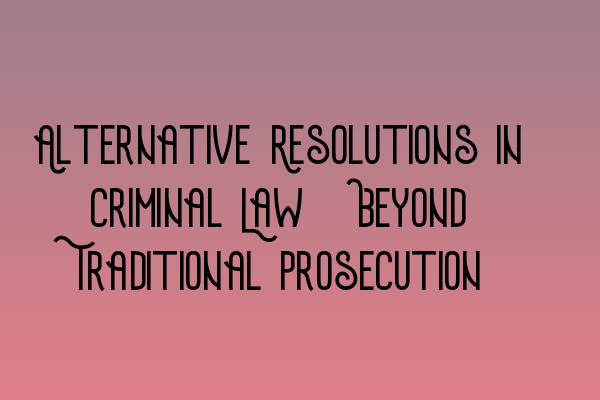Alternative Resolutions in Criminal Law: Beyond Traditional Prosecution
Welcome to the SQE Criminal Law & Practice Law UK blog. In today’s post, we will explore alternative resolutions in criminal law that go beyond traditional prosecution. Criminal law is complex and often involves lengthy court proceedings, but there are alternative methods available that can bring about fair resolutions without the need for a full trial.
The Rise of Alternative Resolutions
As legal practitioners, it is important to keep up with the changing landscape of criminal law. Alternative resolutions have gained momentum in recent years as a means to efficiently resolve criminal cases. These methods offer benefits to all parties involved, including cost savings, reduced strain on the justice system, and opportunities for offenders to rehabilitate and reintegrate into society.
One notable alternative resolution is restorative justice, which focuses on the needs of the victims and encourages the offender to take responsibility for their actions. This process often involves mediated discussions between the offender and the victim, where they can express their feelings and reach a mutually agreed resolution. Restorative justice has been proven to reduce recidivism rates and foster healing for all parties involved.
Another alternative resolution gaining popularity is diversion programs. These programs aim to divert certain low-level offenders away from the traditional criminal justice system. Instead of facing prosecution, eligible offenders may participate in community service, counseling, or rehabilitation programs. Diversion programs not only hold offenders accountable but also address the underlying issues that may have contributed to their criminal behavior.
Benefits and Considerations
Alternative resolutions offer several benefits over traditional prosecution. These include:
- Efficiency: Alternative resolutions often lead to quicker case resolutions, saving both time and resources for all parties involved.
- Cost Savings: Avoiding lengthy court proceedings can significantly reduce the financial burden on the justice system.
- Rehabilitation: Alternative resolutions provide opportunities for offenders to address the root causes of their behavior and make positive changes.
- Restorative Justice: Options like restorative justice can empower victims by giving them a voice in the resolution process.
However, it is crucial to consider the appropriateness of alternative resolutions for each individual case. Factors such as the severity of the offense, prior criminal history, and the willingness of the offender to participate must be taken into account.
Working Towards a Balanced Approach
As legal professionals, it is our duty to explore all available options for our clients. By staying informed about alternative resolutions, we can provide tailored advice and guidance to those facing criminal charges. Our team at SQE Criminal Law & Practice Law UK specializes in criminal law matters and can help you navigate the complexities of your case.
If you have any questions regarding alternative resolutions in criminal law or require legal assistance, please do not hesitate to contact us.
For further information on related topics, you may find the following articles helpful:
